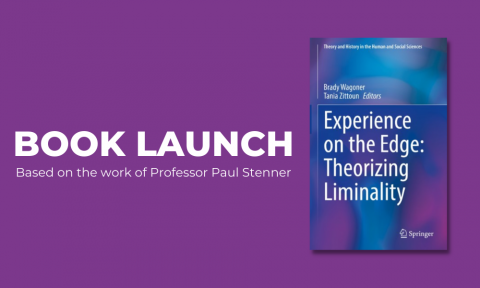Experience on the edge? A new book based around the work of Professor Paul Stenner

Fresh off the press is a new book published by Springer entitled Experience on the edge: Theorizing liminality. Springer. The book is edited by Brady Wagoner from Aalborg University in Denmark, and Tania Zittoun from the University of Neuchâtel, Switzerland. The book is based around the innovative approach to social and cultural psychology developed by Professor Paul Stenner, Co-Director of the Open Psychology Research Centre at The Open University.
The core of the book is a public presentation given by Professor Stenner at the first ever ‘Innovations in Psychology’ lecture. The lecture, entitled Theorising liminality between art and life: The liminal sources of cultural experience, was hosted by the Centre for Cultural Psychology at Aalborg University, Denmark. Building on the former ‘Niels Bohr Lectures in Cultural Psychology’, every year the Centre for Cultural Psychology invites a leading psychologist ‘who is developing a genuinely original theoretical approach’. The keynote lecture is given to an international audience and is followed by presentations from a series of commentators who probe, test and extend the theory, relating it to their own research expertise.
The new book contains the keynote lecture, followed by eight chapters from commentators. Although the book is theoretical, these chapters include extensive discussion of a number of quite practical real world problems, including: art therapy for cancer patients (Kirsten Roessler et al); the navigation of uncertainty in clinical encounters with GPs (Mads Bank and Lotte Huniche); the predicaments of older caregivers looking after terminally ill spouses (Tessa Morgan, Robbie Duschinsky and Stephen Barclay); experiences of pilgrimage (Zachary Beckstead); the management of emotional issues in children’s play (Martina Cabra); the ethical ambiguity of ‘moral holidays’ taken by Danish tourists (Sana Schliewe and Sébastien Tutenges). It also contains chapters by Tania Zittoun and Robert Innes which develop Stenner’s theoretical contribution. The book ends with a final chapter in which Professor Stenner reviews the eight commentaries and identifies underlying themes and tensions.
As Professor Jaan Valsiner clarifies in the preface, liminality is essential to human psychology because all experience is lived forward into an unknown future. Liminality is experience-in-becoming. But at the same time ‘the human psychological organization is set up to eliminate liminality by way of various order-generating devices – categorization, gestalt formation, and construction of meaning hierarchies’. Because of this built-in tendency to eliminate liminality, it has proved too easy for psychologists to ignore it and assume a ‘non-developmental perspective’. Professors Tania Zittoun and Brady Wagoner welcome Stenner’s ‘innovative theoretical development of the concept of liminality’. It overcomes the ‘tendency to turn processes into things’ which ‘has been a major stumbling block for psychology since its beginning'. As they point out, a problem with complex theories is that they often seem too remote from concrete problems. Not so in this case: ‘Paul Stenner has done a remarkable work of clarification of his model, which invites people to use it to reflect on concrete interventions’.
Wagoner, B. & Zittoun, T. (Eds) (2021) Experience on the edge: Theorizing liminality. Springer.
Request your prospectus
![]()
Explore our qualifications and courses by requesting one of our prospectuses today.